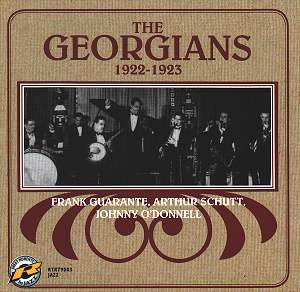I
Wish I Could Shimmy like My Sister Kate
2. Chicago
3. Way Down Yonder in New Orleans
4. Nothing But
5. Loose Feet
6. Aggravatin’ Papa
7. You Tell Her – I Stutter
8. You’ve Got to See Mama Ev’ry Night
9. Farewell Blues
10. Snakes Hips
11. Old King Tut
12. Barney Google
13. Henpecked Blues
14. Long Lost Mama
15. Land of Cotton Blues
16. Mama Loves Papa
17. Mama Goes Where Papa Goes
18. Somebody’s Wrong
19. I’m Sitting Pretty in a Pretty Little
City
20. Learn to Do the Strut
21. Home Town Blues
22. You May Be Fast but Your Mama’s Gonna
Slow You Down
23. Shake Your Feet
24. Old Fashioned Love
Frank Guarente – Trumpet, director
Ray Stilwell – Trombone (tracks 1-4)
Russ Morgan – Trombone (tracks 5-14)
Archie Jones – Trombone (tracks 15-24)
Johnny O'Donnell - Clarinet, bass clarinet,
alto sax
Frank Smith - Clarinet, soprano sax (tracks
11-18)
Dick Johnson - Clarinet, alto sax, tenor sax
(tracks 19-24)
Harold "Red" Salier – Soprano sax,
alto sax, tenor sax (tracks 3-7)
Arthur Schutt – Piano
Russell Deppe – Banjo
Joe Tarto – Bass (tracks 1-12)
Chauncey Morehouse – Drums (tracks 6, 7, 13-24)
The
Georgians can claim that they were one of
the first "bands within a band",
as they were an offshoot of the Phil Specht
Orchestra. From 1922, Phil’s band played at
New York’s Hotel Alamac, but some of the musicians
also played as the Georgians in the hotel’s
night club, the Congo Room. They were led
by trumpeter Frank Guarente, who was born
in Italy but whose family settled in New Orleans
in 1914. There Gaurente took lessons from
King Oliver and later toured with various
bands. Thus he was well experienced when he
started work with Phil Specht in 1921 and
he led the Georgians with expertise and aplomb.
The Georgians also had the asset that their
chief arranger was pianist Arthur Schutt,
who is well known for his work with the likes
of Bix Beiderbecke and Red Nichols.
This
generous collection illustrates the imagination
that Arthur Schutt brought to his arrangements
for the Georgians, often making the band sound
larger than it was and using unusual instruments
like the bass clarinet. Arthur supplies a
firm foundation, leading a rhythm section
underpinned by the sturdy banjo of Russell
Deppe and the sterling drumming of Chauncey
Morehouse (who even gets to do a solo on drum
brushes in Land of Cotton Blues). The
harmonising sections behind soloists and the
call-and-response towards the end of I’m
Sitting Pretty in a Pretty Little City became
familiar devices in later arrangements by
such people as Don Redman. These tracks show
the advances, especially in arranging, that
had been made in the five years since the
Original Dixieland Jazz Band’s recordings
of 1917.
Frank
Guarente is the outstanding soloist but these
recordings also contain fine solos from such
musicians as Johnny O’Donnell and the other
reedmen. The recording quality is what you
might expect from the 1920s but you can hear
the instruments with remarkable clarity. The
excellent audio restoration was done by the
late lamented John R. T. Davies, the master
magician (and musician) who improved the sound
quality of many classic recordings like this.
Incidentally, this compilation was originally
put together in 1996 but the album is now
available from Retrieval through New Note
Distribution.
We
can hope that this disc will make jazz fans
more aware of a pioneering band which in some
ways was ahead of its time.
Tony Augarde
